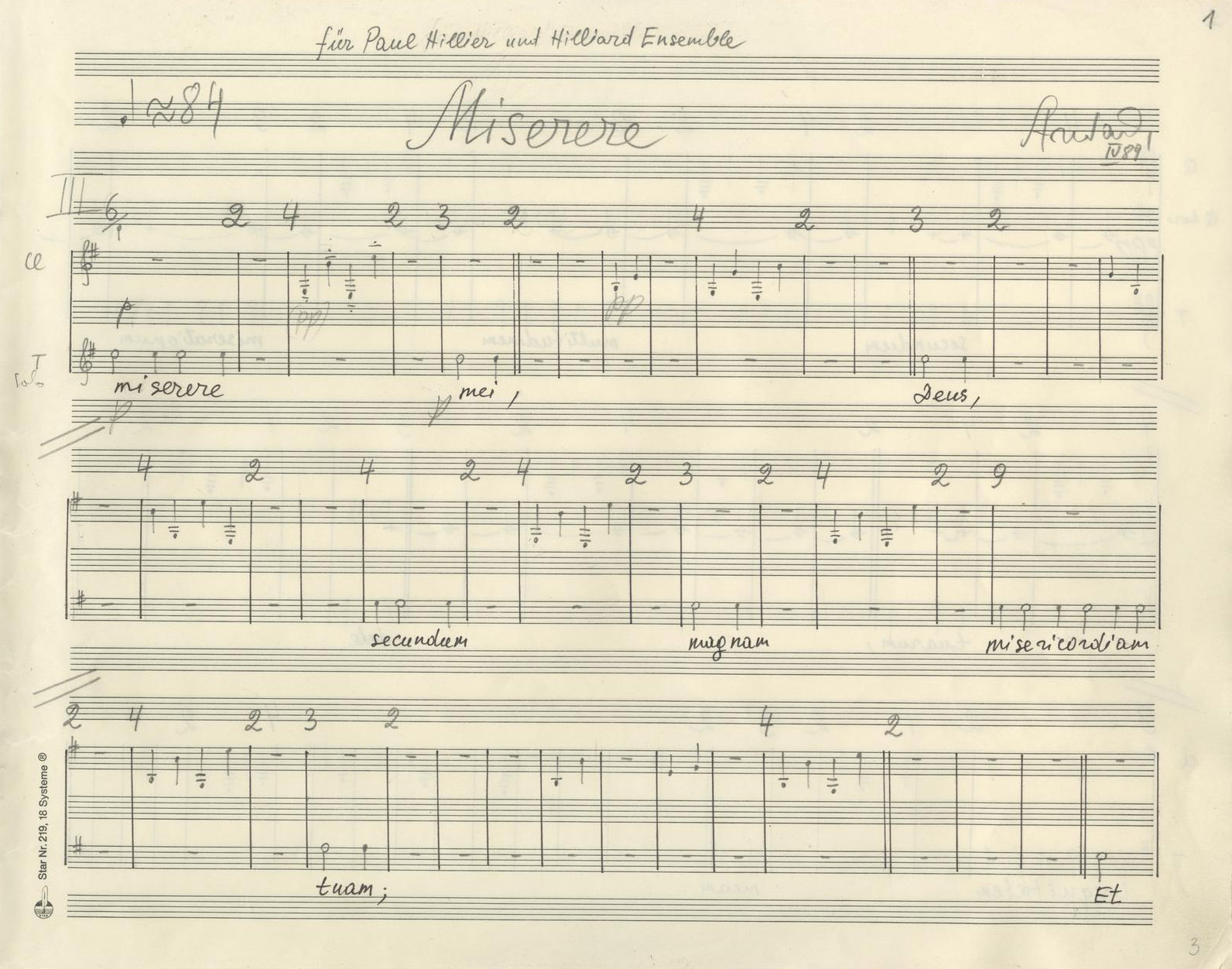Psalm 50 (51), sequence "Dies irae" 1-8 from the Roman Catholic Requiem mass
Miserere mei, Deus, secundum magnam misericordiam tuam. Et secundum multitudinem miserationum tuarum, dele iniquitatem meam.
Amplius lava me ab iniquitate mea et a peccato meo munda me.
Quoniam iniquitatem meam ego cognosco, et peccatum meum contra me est semper.
Dies irae, dies illa
solvet saeclum in favilla:
teste David cum Sibylla.
Quantus tremor est futurus,
quando iudex est venturus,
cuncta stricte discussurus.
Tuba mirum spargens sonum
per sepulcra regionum,
coget omnes ante thronum.
Mors stupebit et natura,
cum resurget creatura,
iudicanti responsura.
Liber scriptus proferetur,
in quo totum continetur,
unde mundus iudicetur.
Iudex ergo cum sedebit,
quidquid latet apparebit.
Nil inultum remanebit.
…
Psalm 50 (51), sequence "Dies irae" 1-8 from the Roman Catholic Requiem mass
Miserere mei, Deus, secundum magnam misericordiam tuam. Et secundum multitudinem miserationum tuarum, dele iniquitatem meam.
Amplius lava me ab iniquitate mea et a peccato meo munda me.
Quoniam iniquitatem meam ego cognosco, et peccatum meum contra me est semper.
Dies irae, dies illa
solvet saeclum in favilla:
teste David cum Sibylla.
Quantus tremor est futurus,
quando iudex est venturus,
cuncta stricte discussurus.
Tuba mirum spargens sonum
per sepulcra regionum,
coget omnes ante thronum.
Mors stupebit et natura,
cum resurget creatura,
iudicanti responsura.
Liber scriptus proferetur,
in quo totum continetur,
unde mundus iudicetur.
Iudex ergo cum sedebit,
quidquid latet apparebit.
Nil inultum remanebit.
Quid sum miser tunc dicturus?
Quem patronum rogaturus,
cum vix iustus sit securus?
Dies irae, dies illa
solvet saeclum in favilla:
teste David cum Sibylla.
Tibi soli peccavi et malum coram te feci, ut iustificeris in sermonibus tuis, et vincas cum iudicaris.
Ecce enim in iniquitatibus conceptus sum et in peccatis concepit me mater mea.
Ecce enim veritatem dilexisti; incerta et occulta sapientiae tuae manifestasti mihi.
Asperges me hyssopo, et mundabor; lavabis me et super nivem dealbabor.
Auditui meo dabis gaudium et laetitiam et exsultabunt ossa humiliata.
Averte faciem tuam a peccatis meis et omnes iniquitates meas dele.
Cor mundum crea in me, Deus, et spiritum rectum innova in visceribus meis.
Ne proiicias me a facie tua et spiritum sanctum tuum ne auferas a me.
Redde mihi laetitiam salutaris tui et spiritu principali confirma me.
Docebo iniquos vias tuas et impii ad te convertentur.
Libera me de sanguinibus, Deus, Deus salutis meae et exsultabit lingua mea iustitiam tuam.
Domine, labia mea aperies et os meum annuntiabit laudem tuam.
Quoniam si voluisses sacrificium, dedissem utique; holocaustis non delectaberis.
Sacrificium Deo spiritus contribulatus; cor contritum et humiliatum, Deus, non despicies.
Benigne fac, Domine, in bona voluntate tua Sion ut aedificentur muri Ierusalem.
Tunc acceptabis sacrificium iustitiae, oblationes et holocausta; tunc imponent super altare tuum vitulos.
Rex tremendae maiestatis,
qui salvandos salvas gratis,
salva me, fons pietatis.
Have mercy upon me, O God, according to thy lovingkindness: according unto the multitude of thy tender mercies blot out my transgressions.
Wash me throughly from mine iniquity, and cleanse me from my sin.
For I acknowledge my transgressions: and my sin is ever before me.
Day of wrath and doom impending,
David’s word with Sibyl’s blending!
Heaven and earth in ashes ending!
O what fear man’s bosom rendeth
When from heaven the Judge descendeth,
On whose sentence all dependeth!
Wondrous sound the trumpet flingeth,
Through earth’s sepulchers it ringeth,
All before the throne it bringeth.
Death is struck, and nature quaking,
All creation is awaking,
To its judge an answer making.
Lo! the book exactly worded,
Wherein all hath been recorded;
Thence shall judgment be awarded.
When the Judge His seat attaineth,
And each hidden deed arraigneth,
Nothing unavenged remaineth.
What shall I, frail man, be pleading?
Who for me be interceding,
When the just are mercy needing?
Day of wrath and doom impending,
David’s word with Sibyl’s blending!
Heaven and earth in ashes ending!
Against thee, thee only, have I sinned, and done this evil in thy sight: that thou mightest be justified when thou speakest, and be clear when thou judgest.
Behold, I was shapen in iniquity; and in sin did my mother conceive me.
Behold, thou desirest truth in the inward parts: and in the hidden part thou shalt make me to know wisdom.
Purge me with hyssop, and I shall be clean: wash me, and I shall be whiter than snow.
Make me to hear joy and gladness; that the bones which thou hast broken may rejoice.
Hide thy face from my sins, and blot out all mine iniquities.
Create in me a clean heart, O God; and renew a right spirit within me.
Cast me not away from thy presence; and take not thy holy spirit from me.
Restore unto me the joy of thy salvation; and uphold me with thy free spirit.
Then will I teach transgressors thy ways; and sinners shall be converted unto thee.
Deliver me from bloodguiltiness, O God, thou God of my salvation: and my tongue shall sing aloud of thy righteousness.
O Lord, open thou my lips; and my mouth shall shew forth thy praise.
For thou desirest not sacrifice; else would I give it: thou delightest not in burnt offering.
The sacrifices of God are a broken spirit: a broken and a contrite heart, O God, thou wilt not despise.
Do good in thy good pleasure unto Zion: build thou the walls of Jerusalem.
Then shalt thou be pleased with the sacrifices of righteousness, with burnt offering and whole burnt offering: then shall they offer bullocks upon thine altar.
King of majesty tremendous,
Who dost free salvation send us,
Fount of pity, then befriend us!
“Dies irae” translation by William Josiah Irons


